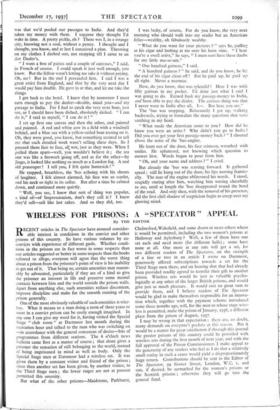WIRELESS FOR PRISONS: A " SPECTATOR " APPEAL
By THE EDITOR
RECENT articles in The Spectator have aroused consider- able interest in conditions in the convict and other prisons of this country. So have various volumes by ex- convicts with experience of different gaols. Whether condi- tions in the prisons are in fact worse in some respects than our articles suggested or better in some respects than the books referred to allege, everyone will agree that the worst thing about a prison from the prisoner's point of view is his inability to get out of it. That being so, certain amenities may reason- ably be advocated, particularly if they are of a kind to give the prisoner an interest in life and preserve some mental contacts between him and the world outside the prison walls. Apart from anything else, such amenities reduce discontent, improve discipline and make for the smooth running of the prison generally.
One of the most obviously valuable of such amenities is wire- less. What it means to a man doing a term of three years or more in a convict prison can be easily enough imagined. In any case I can give my word for it, having visited the Special Stage " club room " at Dartmoor last month during the recreation hour and talked to the man who was switching on —in accordance with the general consensus of desire—bits of programmes from different stations. The 6 o'clock news bulletin came first as a matter of course ; that alone gives a prisoner the sensation of still belonging to the world, instead of being imprisoned in mind as well as body. Only the Special Stage men at Dartmoor had a wireless set. It was given them by a constant visitor and friend of the prison ; since then another set has been given, by another visitor, to the Third Stage men ; the lower stages are not at present permitted this amenity. But what of the other prisons—Maidstone, Parkhurst, Chelmsford, Wakefield, and some dozen or more others where it would be permitted, including the two women's prisons at Holloway and Aylesbury ? Well, a few of them have one set each and need more (for different halls) ; some have none at all. One more at any rate will get a set, for two different readers of The Spectator, on the strength of a line or two in an article I wrote on Dartmoor, generously offered subscriptions towards a set for the Third Stage men there, and on hearing that that had already been provided readily agreed to transfer their gift to another prison. Wireless sets would be just as valuable psycho- logically at any other of the larger British prisons, and would give just as much pleasure. It would cost no great sum to provide them, and I believe readers of The Spectator would be glad to make themselves responsible for an innova- tion which, together with the payment scheme introduced some three months ago, will, for the men to whose stage wire- less is permitted, make the prison of January, 1938, a different place from the prison of August, 1937. I may be wrong in that expectation ; there are, no doubt, many demands on everyone's pockets at this season. But it would be a matter for great satisfaction if through this journal the greater prisons of this country could be provided with wireless sets during the first month of next year, and with the full approval of the Prison Commissioners I make appeal to the generosity of any readers who feel as I do that a relatively small outlay in such a cause would yield a disproportionately large return. Contributions should be sent to the Editor of The Spectator, 99 Gower Street, London, W.C. t, and can, if desired, be earmarked for the women's prisons or the Scottish prisons ; otherwise they will go into the general fund.














































 Previous page
Previous page